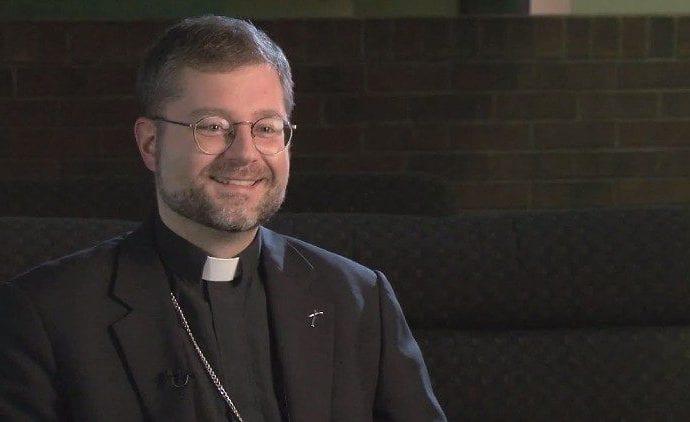|
Montreal’s Dowd shows different face of ‘the bishops’ on the abuse crisis
By John L. Allen Jr.
Every Catholic, sooner or later, is tempted to despair about “the bishops,” no matter what their particular lament or desideratum. As novelist John Sandford once had his hero detective, Lucas Davenport, put it, “Holy Rollers scream about Jesus, but Catholics scream at the bishops.” On no front has that been truer of late than the clerical sexual abuse crisis. Indeed, sometimes it seems the lone thing the Catholic left and right can agree on vis-à-vis the scandals is the dismal performance of the hierarchy. For everyone tempted to such a complaint, however, there’s also Bishop Thomas Dowd. An auxiliary bishop of the Archdiocese of Montreal in Canada, Dowd was recently in a radio feature by the Canadian Broadcasting Corporation with the deliberately provocative headline, “Meet the Catholic bishop who brought a pedophile priest to justice.” The report tells the story of Dowd’s efforts to bring a Montreal priest named Brian Boucher to justice. Last January, Boucher was convicted of sexually abusing two minor boys, following two separate legal proceedings, and was sentenced to eight years in prison. The fact that Boucher’s cases ever went to trial was largely a result of Dowd’s efforts to identify victims after hearing rumors of misconduct, and then presenting his findings to police and prosecutors. A Canadian survivor of clerical sexual abuse was the one who called my attention to the CBC report, saying of Dowd: “God knows we need this type of leadership more than ever in our very troubled world.” In the report, Dowd said he began hearing rumors about Boucher when he was named a Montreal auxiliary in July 2011, and he took it upon himself to follow up. After several suggestive conversations, he said, he found a victim who was willing to come forward and accompanied him to the police station to make a report. In the end, Dowd also attended every day of Boucher’s trial. After Boucher’s sentencing, Dowd read a prepared statement before TV cameras in which he called the victims in the case his “heroes,” and voiced open contempt for the priest. “How could you do this? You were given the love and trust of literally hundreds of people, you betrayed and manipulated them, you shamed the Church and discredited the work of your fellow brother priests, and one day you’ll face the even greater judgment of God himself,” Dowd said. In terms of ecclesiastical judgment, Dowd told me that the Vatican’s Congregation for the Doctrine of the Faith delegated responsibility for Boucher’s case to the Archbishop of Montreal, who imposed laicization, meaning removal from the priesthood. However, under Church law Boucher would have had a right of appeal, and while there’s no indication he exercised it, the archdiocese is awaiting final word from the Vatican. Dowd’s story illustrates three points in thinking about the role of “the bishops” in the abuse scandals. First, though we tend to forget, Canada is actually in some ways where it all began in terms of what we know today as the clerical sexual abuse crisis. It was there, in Newfoundland in 1988, that Father James Hickey pled guilty to 20 charges of sexual assault, gross indecency and indecent assault involving teenage boys, and shortly thereafter a massive scandal erupted pivoting on sexual assault charges at the Mount Cashel Orphanage operated by the Christian Brothers. In the end, almost $27 million has been paid out in settlements to survivors of abuse at the orphanage. In 1992, on the back of those scandals, the Catholic bishops of Canada adopted a set of guidelines for preventing, investigating and responding to clerical sexual abuse, a full decade ahead of the U.S. “Dallas Charter” in 2002. The Canadian saga has been overshadowed by later scandals in the U.S., Ireland, Australia, Germany, Chile, and points beyond, but it’s worth recalling that few local churches have been dealing with these issues longer than the Canadians, and there are lessons from their experience worth learning. Second, Dowd is one of those clergy who hasn’t always moved in a clerical world. After college he went to work for Ericsson Research Canada, a branch of the Swedish high-tech giant, eventually becoming the head of their Global Integration and Verification Organization. (Dowd said of that experience in a 2018 Crux interview, “I was on the internet before most people even knew what the internet was.”) Someone with that kind of background doesn’t have exclusively clerical instincts or clerical measures for determining what’s appropriate when misconduct is reported. He knows how it would be handled in a corporate setting too, and what the liability is for mishandling it. Third, Dowd is part of a generational transition in the Catholic hierarchy, toward a cohort of bishops not tainted by the mistakes of the past and seemingly determined not to repeat them. Dowd was born in 1970, meaning he would have been the equivalent of an American high school senior when the Hickey case broke. He was ordained a priest in 2001, just before the American scandals blew up, and didn’t become a bishop until being named to Montreal in 2011. Not only does he therefore bear no responsibility for how any abuse claims were handled prior to eight years ago, his entire priesthood has been scarred by the legacy of past failures, and now his ministry as a bishop is haunted by them as well. As a result, bishops such as Dowd have strong incentives to get things right. If nothing else, Dowd’s experience is worth bearing in mind the next time someone pops off about “the bishops” with regard to the abuse crisis, because it’s a reminder, as ever in Catholicism, that things are more complicated than they may seem.
|
.
Any original material on these pages is copyright © BishopAccountability.org 2004. Reproduce freely with attribution.
